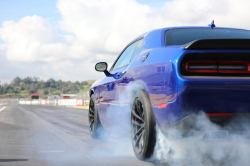
— A Dodge class action lawsuit alleges the rear differentials in 2014-2019 Dodge Challenger and Dodge Charger cars with V8 engines allegedly cannot handle the horsepower and torque loads produced by the engines and transmissions.
The class action alleges this causes the rear differential and its components to prematurely wear out and fail.
The Dodge class action lawsuit was filed by six plaintiffs.
- Gustavo Diaz (California): 2015 Dodge SRT Challenger Hellcat
- Christian Gibson (Florida): 2018 Dodge Challenger Demon
- Joseph Santos (California): 2016 Dodge Charger Hellcat
- Gerald Sinclair (Florida): 2016 Dodge Charger Hellcat
- Marvin Leon Veal (Florida): 2019 Dodge Charger Hellcat
- Domenick Scorziello (New York): 2018 Dodge Challenger Demon
According to the lawsuit, the rear differential is described as a gear-based component that allows the rear tires to rotate at different speeds when the car is turning a corner.
The Dodge Challenger and Charger cars, including Charger Hellcats, Challenger Hellcats and Demons, have the Street & Racing Technology (SRT) badges because the cars are supposed to be track-ready.
The Dodge class action alleges the rear differentials make howling, whirling and whining sounds as drivers feel vibrations from the rear-ends.
Motion to Dismiss the Dodge Class Action Lawsuit
In its motion to dismiss, FCA points out how two plaintiffs never had any problems with their cars and no plaintiff ever paid for any rear differential repairs.
And the automaker also argues the plaintiffs never describe how the rear differentials are supposedly defective.
Additionally, Chrysler says, "there is not a single factual assertion showing any Plaintiff (or anyone at all) paid for a repair, sold their vehicle at a loss or that the market generally reflects a loss of value for Plaintiffs’ vehicles."
FCA told the judge a plaintiff must plead facts showing the automaker knew of the alleged defect before the sale of a vehicle in order to state any claim based on an alleged omission.
The plaintiffs respond by saying Chrysler must have known based on “knowledge of alternative designs,” consumer complaints, “aggregate warranty data,” “repair orders and parts data,” and “several service bulletins.”
But FCA told the judge these allegations aren't good enough because they are generic and conclusory, especially alleged knowledge based on technical service bulletins (TSBs).
According to FCA, the TSBs listed in the class action have no connection to the alleged rear differential defect.
"Although it has never happened to any one of them, Plaintiffs allege the rear differential 'often explodes' when it fails, 'sending shrapnel into the undercarriage of the vehicle and damaging ancillary parts.' Plaintiffs also aver vehicles will 'suddenly become inoperable when the [rear] differential fails.'” — Fiat Chrysler
But Chrysler argues none of the TSBs have anything to do with exploding rear differentials or vehicles that aren't operable.
In its motion to dismiss the lawsuit, FCA also alleges the plaintiffs failed to show their vehicles are unmerchantable, and a "claim for breach of implied warranty is only viable if Plaintiffs’ vehicles 'did not possess even the most basic degree of fitness for ordinary use.'”
Moving to fraudulent concealment claims, Chrysler argues the economic loss doctrine bars fraudulent concealment claims where there are no allegations of personal injury or property damage other than to the product itself.
According to the automaker, the alleged damages are economic and not based on personal injury or property damage.
The plaintiffs also allegedly have no misrepresentation claims because they allegedly don't identify any specific Chrysler statements they believe are false. And the plaintiffs allegedly do not identify any statements made to them that caused them to purchase the Dodge cars.
According to FCA, the plaintiffs are trying to sue over statements that are nothing more than "puffery," which is nonactionable.
FCA's motion further alleges all claims from the California plaintiffs should be dismissed because they are time-barred.
In asking the judge to dismiss all the claims in the Dodge class action lawsuit, Chrysler says four of the six plaintiffs don't allege they stopped driving their cars, and the other two plaintiffs have never even sought any car repairs.
The Dodge class action lawsuit was filed in the U.S. District Court for the District of Delaware: Diaz, et at., v. FCA US LLC.
The plaintiffs are represented by Berger Montague PC, Capstone Law APC, and Gordon & Partners, P.A.




